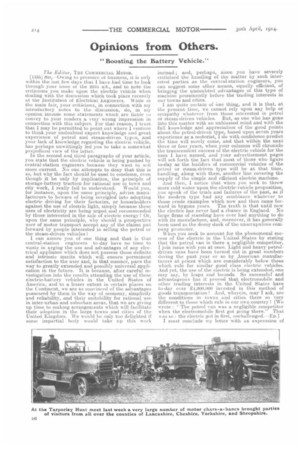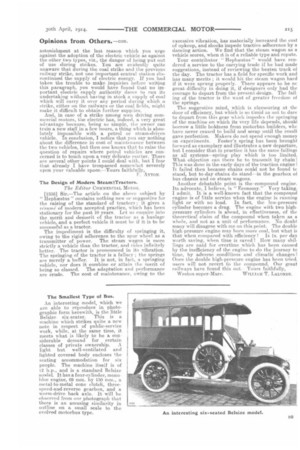Opinions from Others.
Page 18

Page 19

If you've noticed an error in this article please click here to report it so we can fix it.
"Boosting the Battery Vehicle."
The Editor, THE CO3-1MERCIAL MOTOR. [I:335] thr,—.0wing to pressure of business, it is only within the last. few days that I have had time to look through your issue of the 26th ult., and to note the criticisms you make upon the electric vehicle when dealing with the discussion which took place recently at the Institution of Electrical Engineers. While in the main fair, your criticisms, in connection with my introductory ,notes to the discussion, do, in my opinion include some statements which are liable ie convey to your readers a very wrong impression in connection with this subject. For that reason, I trust that I may be permitted to point out where 1 venture to think your undoubted expert knowledge and great experience of petrol and steam-driven types, and your lack of knowledge regarding the electric vehicle, has .perhaps unwittingly led you to take a somewhat prejudiced view of the latter.
In the second and third paragraphs of your article, you state that the electric vehicle is being pushed by central-station engineers because they want to sell more current. No one attempts to deny that this is so, but why the. fact should be used to condemn, even though it be only by implication, the principle of storage-battery traction for rational use in town and city work, I really fail to understand. Would you, for instance, upon the same principle, advise manufacturers to beware of being inveigled into adopting electric driving for their factories, or householders against the use of electric light, simply because these uses of electricity are being urged and recommended by those interested in the sale of electric energy ? Or, upon the same principle, why should a prospective user of motor transport accept any of the claims put forward by people interested in selling the petrol or the steam-driven vehicles ?
I can assure you of ono thing and that is that central-station engineers to-day have no time to waste in urging the use and advantages of any electrical appliance which does not possess those definite and intrinsic merits which will ensure permanent satisfaction to the user and, in that manner, pave the way to greatly extended and possibly universal application in the future. It is because, after careful investigation into the results attending the use of these electric-battery vehicles in the United States of America, and to a lesser extent in certain places on the Continent., we are so convinced of the advantages possessed by them in the way of economy, simplicity and reliability, and their suitability for rational use in inter-urban and suburban areas, that we are giving up thne to making arrangements which will facilitate their adoption in the large towns and cities of the United Kingdom. We would be only too delighted if some impartial body would take up this work instead; and, perhaps, since you have severely criticised the handling of the matter by such interested parties as the central-station engineers, you can suggest some other means, equally efficient, of bringing the undoubted advantages of this type of machine prominently before the trading interests in. our towns and cities. I am quite certain of one thing, and it is that, at the present time, we cannot rely upon any help or sympathy whatever from those interested i.n petrol or steam-driven vehicles. But, as one who has gone into this matter with an unbiassed mind and with the full knowledge and appreciation of the good points about the petrol-driven type, based upon seven years experience as a motorist, I do with confidence predict the time will surely come, and that within the next three or four years, when your columns will chronicle the transcendent success of the electric vehicle for the uses 1 have named, and your advertisement pages will set forth the fact that most of those who figure to-day as the builders of commercial vehicles of the petrol or steam-driven type will be at that time, handling, along with them, another line covering the supply of the simple and efficient electric machine. And then, I notice that when you seek to throw more cold water upon the electric-vehicle proposition, you speak of the trials and failures of the past, as if the modern type had any semblance whatever to those crude examples which now and then came forward in bygone years. The truth is that until now the electric has never had a chance in England. No large firms of standing have ever had anything to do with Its manufacture, and, moreover, it has generally been used as the decoy duck of the unscrupulous company promoter.
When you seek to account for the phenomenal success of the electric in the United States by stating that the petrol van is there a negligible competitor, I join issue with you at once. Light and heavy petroldriven vans have been turned out in great numbers during the past year or so by American manufacturers at prices which are considerably below those which rule for similar good class electric vehicles. And yet, the use of the electric is being extended, one may say, by leaps and bounds. So successful and advantageous has it proved that electromobile and other trading interests in the United States have to-day over £4,000,000 invested in this method of goods transportation ! And, wherein, may I ask, are the conditions in towns and cities there so very different to those which rule in our own country ? [We wrote : "The petrol van was a negligible competitor when the electromobile first got going there." That was so : the electric got in first, unehallenged—Eal
I must conclude my letter with an expression of astonishment at the last reason which you urge against the adoption of the electric vehicle as against the other two types, viz., the danger of being put out of use during strikes. You are evidently quite unaware that during the coal strike and the previous railway strike, not one important central station discontinued tho supply of electric energy. If you had taken the trouble to make inquiries before, writing this paragraph, you would have found that no important electric supply authority dares to run its undertaking without having m stock a supply of coal which will carry it over any period during which a, strike, either on the railways or the coal fields, might make it difficult to obtain further supplies.
And, in case of a strike among men driving commercial motors, the electric has, indeed, a very great advantage because, being so simple, the owner can train a new staff in a few hours, a thing which is absolutely impossible with a petrol or steam-driven vehicle. In conclusion, I notice that you say nothing about the difference in cost of maintenance between the two vehicles, but then one knows that to raise the question of repairs where petrol vehicles are concerned is to touch upon a very delicate matter. There are several other points I could deal with, but I fear that already I have. trespassed somewhat severely upon your valuable space.—Yours faithfully,
F. A.YTON.
The Design of Modern Steam3Tractors.
The Editor COMMERCIAL MOTOR.
[1336] Sir.—The article on the above subject by " Rephwstus " contains nothing new or suggestive for the raising of the standard of tractors ; it gives a 7.1,??I'MZ of modern accepted practice, which has been stationary for the past 10 years. Let as enquire into the merit and demerit of the tractor as a haulage vehicle, and a perfect vehicle it must be if it is to be successful as a tractor.
The impediment is the difficulty of springing it, owing to the rigid adherence to the spur wheel as a tra.nsmitter of power. The steam wagon is more strictly a. vehicle than the tractor, and rides infinitely better. The tractor is pronounced in its vibration. The springing of the tractor is a fallacy ; the springs are merely a buffer. It is not, in fact, a springing vehicle, nor does it combine or attain the merit of being so classed. The adaptation and performance arc crude. The cost of maintenance, owing to the
excessive vibration, has materially increased the cosi of upkeep, and shocks impede tractive adherence by a dancing action. We find that the steam wagon as a vehicle scores, when it is of a reliable type and repute.
Your contributor " Hephmstus " would have rem dered a service to the carrying trade if be had made suggestions, instead of reviewing the beaten track oi the day. The tractor has a field for specific work and has many merits ; it would hit thc steam wagon hard if it were sprung properly. There appears to be nc great difficulty in doing it, if designers only had the courage to depart from the present design. The failing of the tractor is the want of greater freedom of the springs.
The suggestive mind, which is clamouring at the door of efficiency, but which is so timid as not to dare to depart from this gear which impedes the springing of the machine on which its very life depends, should borrow a little boldness from motorbus builders, whc have never ceased to build and scrap until the result gave perfection. Makers do not spend enough money on experiments. Foster's spring has been brought forward as exemplary and illustrates a new departure, but I consider that in practice it has the same failings as all systems—spring play which is too limited, What objection can there be to transmit by chain This was done in the early days of the traction enginel It failed then because chains could not be found tc stand, but to-day chains do stand--in the gearbox of bus chassis and on steam wagons.
Another debatable point is the-compound engine. Its advocate, I believe, is "Economy." Very taking I admit. It is a well-known fact that the compound engine is of little service when the engine is running light or with no load. In fact, the low-pressure cylinder becomes a drag. The engine with two highpressure cylinders is ahead, in effectiveness, of the theoretical claim of the compound when taken as a whole, and not as a. unit of performance. No doubt many will disagree with me on this point. The double high-pressure engine may burn more coal, but what is that when compared with efficiency ? Is is. per day worth saving, when time is saved ? How many shil. lings are paid for overtime which has been caused by the inefficiency of the engine to do the journey to time, by adverse conditions and climatic changes I Once. the double high-pressure engine has been tried, users will not revert fo the &impound_ Our greai railways have found this out. Yours faithfully,
Weston-super-Mare. WILLIAM T. LALONDE,
























